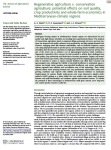Musto G.A., Swanepoel P.A., Strauss J.A. (2023). Regenerative agriculture v. conservation agriculture: potential effects on soil quality, crop productivity and whole-farm economics in Mediterranean-climate regions. The Journal of Agricultural Science, 01/06/2023, vol. 161, n. 3, p. 328-338.
https://doi.org/10.1017/S0021859623000242
https://doi.org/10.1017/S0021859623000242
| Titre : | Regenerative agriculture v. conservation agriculture: potential effects on soil quality, crop productivity and whole-farm economics in Mediterranean-climate regions (2023) |
| Auteurs : | G.A. Musto ; P.A. Swanepoel ; J.A. Strauss |
| Type de document : | Article |
| Dans : | The Journal of Agricultural Science (vol. 161, n. 3, June 2023) |
| Article en page(s) : | p. 328-338 |
| Langues : | Anglais |
| Langues du résumé : | Anglais |
| Catégories : |
Catégories principales 06 - AGRICULTURE. FORÊTS. PÊCHES ; 6.4 - Production Agricole. Système de ProductionThésaurus IAMM SYSTEME DE PRODUCTION ; AGRICULTURE DE CONSERVATION ; PRODUCTIVITE DES TERRES ; REGION MEDITERRANEENNE |
| Mots-clés: | AGRICULTURE REGENERATRICE |
| Résumé : | Small-grain farming systems in Mediterranean climatic regions are characterized by poor quality soils, high climate variability, and resulting heavy agrochemical reliance. The adoption of Conservation Agriculture, based on minimum tillage, permanent soil cover, and crop rotations, has improved soil quality, enhanced crop productivity, and help mitigate financial risk. However, emerging issues that threaten sustainability, such as herbicide resistance, inputs costs rising disproportionately to product prices, and increasing climate variability and unpredictability, drive the need for innovation in small-grain Mediterranean-based CA systems. The aim of the review was to evaluate a set of agroecological practices which constitute a Regenerative Agriculture (RA) concept, for their potential to address these challenges from a soil quality, crop productivity and whole-farm economics perspective. Organic soil amendments derived from agro-wastes, offer promising perspectives for supplying appropriate quantities of nutrients to reduce or replace mineral fertilisers and offset their economic and agroecological costs. Although the viability of microbial bioeffectors in small-grain agroecosystems was largely under question, non-microbial bioeffectors and certain combination options represent more efficient and cost-effective uses of this technology. Their widely reported abiotic stress priming functions and crop productivity enhancement under poor growing conditions may improve yield stability and financial resilience in small-grain Mediterranean CA systems. Finally, multi-species cover crops subjected to adaptive multi-paddock (AMP) grazing as a phase within the crop rotation may reduce weed pressure, enhance soil multi-functionality, and resilience against environmental stresses. To validate the potential of these technologies in Mediterranean small-grain systems, more long-term and context-specific research is called for. |
| Cote : | En ligne |
| URL / DOI : | https://doi.org/10.1017/S0021859623000242 |







